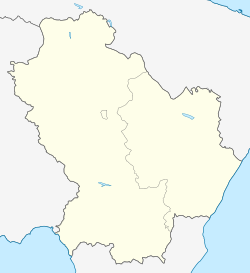Marsico Nuovo: Difference between revisions
Appearance
Content deleted Content added
Vicedomino (talk | contribs) →See also: added a See also |
No edit summary |
||
| (3 intermediate revisions by 3 users not shown) | |||
| Line 20: | Line 20: | ||
| frazioni = Pergola, Galaino, Camporeale, Calabritto |
| frazioni = Pergola, Galaino, Camporeale, Calabritto |
||
| mayor_party = |
| mayor_party = |
||
| mayor = |
| mayor = Massimo Macchia |
||
| area_footnotes = |
| area_footnotes = |
||
| area_total_km2 = 101 |
| area_total_km2 = 101 |
||
| Line 47: | Line 47: | ||
The city's origins are obscure, but, after the destruction by the [[Saracens]] of the ancient ''Grumentum'', the town grew in importance, and became the seat of a county under the [[Italo-Normans|Normans]] (11th century). Its most famous count was [[Sylvester of Marsico]]. |
The city's origins are obscure, but, after the destruction by the [[Saracens]] of the ancient ''Grumentum'', the town grew in importance, and became the seat of a county under the [[Italo-Normans|Normans]] (11th century). Its most famous count was [[Sylvester of Marsico]]. |
||
It was subsequently ruled by the [[Hauteville family|Hauteville]], the Guarna and [[Sanseverino]] families. The last count from the latter, [[Ferrante Sanseverino]], was exiled in 1552 and his fiefs acquired by the Kingdom of Naples. |
It was subsequently ruled by the [[Hauteville family|Hauteville]], the Guarna and [[House of Sanseverino|Sanseverino]] families. The last count from the latter, [[Ferrante Sanseverino]], was exiled in 1552 and his fiefs acquired by the Kingdom of Naples. |
||
==Main sights == |
==Main sights == |
||
| Line 57: | Line 57: | ||
* [[Madonna del Carmine, Marsico Nuovo|Madonna del Carmine]] |
* [[Madonna del Carmine, Marsico Nuovo|Madonna del Carmine]] |
||
* [[Santi Maria di Constantinopoli, Marsico Nuovo|Santi Maria di Constantinopoli]] |
* [[Santi Maria di Constantinopoli, Marsico Nuovo|Santi Maria di Constantinopoli]] |
||
* San Rocco, contains arts from a destroyed church of All Saints. |
|||
==References== |
==References== |
||
| Line 71: | Line 72: | ||
{{authority control}} |
{{authority control}} |
||
[[Category: |
[[Category:Marsico Nuovo| ]] |
||
{{Basilicata-geo-stub}} |
{{Basilicata-geo-stub}} |
||
Latest revision as of 22:01, 28 March 2024
You can help expand this article with text translated from the corresponding article in Italian. (January 2022) Click [show] for important translation instructions.
|
Marsico Nuovo | |
|---|---|
| Comune di Marsico Nuovo | |
 | |
| Coordinates: 40°25′N 15°44′E / 40.417°N 15.733°E | |
| Country | Italy |
| Region | Basilicata |
| Province | Potenza (PZ) |
| Frazioni | Pergola, Galaino, Camporeale, Calabritto |
| Government | |
| • Mayor | Massimo Macchia |
| Area | |
• Total | 101 km2 (39 sq mi) |
| Elevation | 850 m (2,790 ft) |
| Population (31 December 2017)[2] | |
• Total | 4,014 |
| • Density | 40/km2 (100/sq mi) |
| Demonym | Marsicani |
| Time zone | UTC+1 (CET) |
| • Summer (DST) | UTC+2 (CEST) |
| Postal code | 85052 |
| Dialing code | 0975 |
| Patron saint | San Gianuario |
| Saint day | 26 August |
Marsico Nuovo (Lucano: Màrsc) is a town and comune of the province of Potenza in the Basilicata region of southern Italy. It was the seat of the bishops of Grumentum.
It is an agricultural centre in the Agri river valley.
History
[edit]The city's origins are obscure, but, after the destruction by the Saracens of the ancient Grumentum, the town grew in importance, and became the seat of a county under the Normans (11th century). Its most famous count was Sylvester of Marsico.
It was subsequently ruled by the Hauteville, the Guarna and Sanseverino families. The last count from the latter, Ferrante Sanseverino, was exiled in 1552 and his fiefs acquired by the Kingdom of Naples.
Main sights
[edit]This section is written like a travel guide. (January 2022) |
Among the churches in the town are:
- Cathedral of San Giorgio
- San Gianuario
- San Michele Arcangelo
- Madonna del Carmine
- Santi Maria di Constantinopoli
- San Rocco, contains arts from a destroyed church of All Saints.
References
[edit]- ^ "Superficie di Comuni Province e Regioni italiane al 9 ottobre 2011". Italian National Institute of Statistics. Retrieved 16 March 2019.
- ^ Population data from Istat
See also
[edit]



